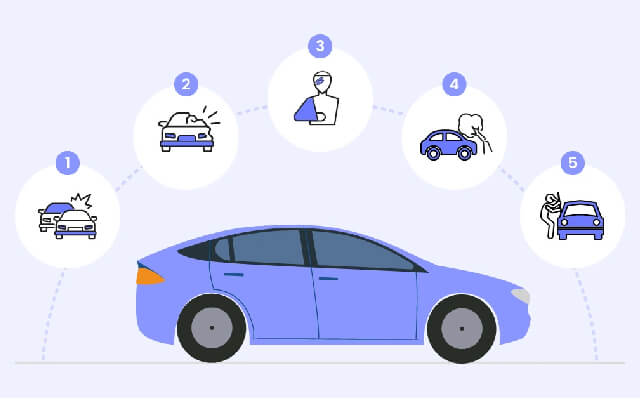In today’s complex and ever-changing world, it is crucial for individuals to protect themselves from unforeseen circumstances. One such circumstance is the occurrence of personal injuries resulting from car accidents.
Personal Injury Protection (PIP) on car insurance is a coverage option that provides financial assistance for medical expenses and other related costs incurred as a result of an accident.
This article aims to provide a comprehensive understanding of PIP, including its coverage limits, benefits, filing procedures, common misconceptions, and comparison with Medical Payments Coverage.
Understanding Personal Injury Protection (PIP
Personal Injury Protection (PIP) is a type of auto insurance coverage that provides medical and rehabilitation expenses to individuals injured in car accidents, regardless of fault. PIP benefits aim to cover medical costs such as hospital stays, doctor visits, surgeries, medications, and rehabilitation services necessary for recovery. These benefits are designed to offer prompt financial assistance to policyholders and their passengers after an accident.
The extent of PIP coverage limits may vary depending on the state regulations and the specific insurance policy. In some states with no-fault auto insurance systems, PIP coverage is mandatory. The minimum required limits usually range from $10,000 to $50,000 per person per accident. However, higher coverage limits may be available for purchase.
It is important for policyholders to understand their PIP benefits and coverage limits in order to make informed decisions about their auto insurance needs. Adequate PIP coverage can provide a safety net by covering medical expenses promptly without having to wait for determination of fault or lengthy legal processes. Understanding the limitations of PIP coverage ensures that individuals can properly assess their potential out-of-pocket expenses in case of an accident.
Coverage Limits and Benefits of PIP
The coverage limits and benefits of PIP vary depending on the specific terms and conditions outlined in the policy. PIP coverage requirements refer to the minimum amount of coverage mandated by law, which can vary from state to state. For instance, some states may require a minimum limit of $10,000 for medical expenses and lost wages, while others may have different thresholds. Additionally, PIP coverage exclusions are provisions that outline situations where PIP benefits may not be available. Common exclusions include injuries sustained during the commission of a crime or while operating a vehicle under the influence of drugs or alcohol. Policyholders should carefully review their insurance policies to understand any additional limitations or restrictions that may apply.
PIP provides various benefits to policyholders who experience personal injuries due to an automobile accident regardless of fault. These benefits typically cover medical expenses such as hospital visits, surgeries, rehabilitation therapies, prescription medications, and even funeral costs in case of death arising from an accident. Furthermore, PIP often includes compensation for lost wages resulting from injury-related disability or time taken off work for recovery purposes.
It is crucial for individuals seeking PIP coverage to thoroughly understand their policy’s terms and conditions to ensure they meet all necessary requirements and avoid potential exclusions that might affect their eligibility for benefits.
How to File a PIP Claim
One important step in the process of filing a PIP claim is gathering all relevant documentation, such as medical records and accident reports. This documentation plays a crucial role in supporting the claim and ensuring that the injured party receives appropriate compensation.
Here are three key types of documentation required during the PIP claim process:
- Medical Records: These include hospital bills, doctor’s notes, and any other records detailing the treatment received for injuries sustained in the accident. It is essential to provide comprehensive medical records to demonstrate the extent of injuries and justify the need for compensation.
- Accident Reports: Obtaining an official accident report from law enforcement or insurance companies is vital. This report includes details about how the accident occurred, parties involved, witness statements, and any citations issued. The accident report serves as objective evidence of what transpired during the incident.
- Proof of Loss: This refers to any documents that establish financial loss resulting from injuries sustained in the accident. Examples may include receipts for prescription medications or invoices from healthcare providers.
Common Misconceptions About PIP
Misconceptions about the process of filing a PIP claim can lead to misunderstandings and potential errors. To clarify some common misconceptions, it is important to understand the benefits of PIP coverage.
One misconception is that PIP benefits are only available for medical expenses resulting from car accidents. However, PIP coverage actually extends beyond medical expenses and can also provide compensation for lost wages, funeral expenses, and other related costs.
Another misconception is that filing a PIP claim will automatically increase insurance premiums. While it is true that filing multiple claims can result in higher premiums, simply filing a single PIP claim does not guarantee an increase in rates. Insurance companies typically consider various factors when determining premium adjustments, such as the policyholder’s driving history and overall claims history.
Additionally, some individuals mistakenly believe that they cannot file a PIP claim if they were at fault for the accident. In reality, fault does not play a role in determining eligibility for PIP benefits. As long as the policy includes this coverage and meets certain requirements specified by the insurance company, individuals may be eligible to file a claim regardless of fault.
Understanding these common misconceptions about PIP can help individuals make informed decisions when it comes to their insurance coverage and claiming benefits after an accident.
PIP Vs. Medical Payments Coverage: What’s the Difference?
PIP and medical payments coverage are two distinct types of insurance policies that provide financial assistance for healthcare expenses, but they differ in terms of eligibility criteria and the extent of coverage they offer.
- PIP (Personal Injury Protection) is a type of auto insurance coverage that helps pay for medical expenses, lost wages, and other related costs resulting from a car accident. It typically covers the policyholder and their passengers, regardless of who was at fault in the accident.
- Medical payments coverage, on the other hand, is an optional add-on to auto insurance policies that pays for medical expenses incurred by the policyholder or their passengers in a car accident. Unlike PIP, it does not cover lost wages or other non-medical expenses.
- The eligibility criteria for PIP vary depending on state laws. In some states, it is mandatory for all drivers to carry PIP coverage as part of their auto insurance policy. In others, it may be optional or not available at all.
Medical payments coverage can be beneficial because:
- It provides quick access to funds for immediate medical treatment after an accident.
- It covers medical expenses even if the policyholder was responsible for causing the accident.
However, there are limitations to medical payments coverage:
- Coverage limits are generally lower compared to PIP.
- It only covers medical expenses and does not provide compensation for lost wages or other non-medical costs.
Frequently Asked Questions
Does Personal Injury Protection (Pip) Cover Injuries Sustained by Passengers in My Vehicle?
Passenger injury coverage is a key aspect of Personal Injury Protection (PIP) on car insurance. PIP provides coverage for injuries sustained by passengers in the insured vehicle, subject to certain eligibility criteria for filing a PIP claim.
Can I Still File a PIP Claim if the Accident Was My Fault?
Fault based PIP claims allow individuals to file for personal injury protection coverage even if the accident was their fault. However, it is important to note that PIP coverage typically does not extend to property damage.
Is PIP Coverage Mandatory in All States?
PIP coverage requirements by state vary, with some states mandating it while others do not. The limits and benefits of PIP coverage also differ depending on the jurisdiction. Understanding these variations is crucial for car insurance policyholders.
How Long Do I Have to File a PIP Claim After an Accident?
PIP claim time limits vary depending on state regulations. It is crucial to familiarize oneself with the specific PIP claim requirements in a particular jurisdiction to ensure compliance and timely submission following an accident.
Can I Use PIP Coverage to Cover Medical Expenses for Injuries Sustained in a Non-Vehicle-Related Accident?
The use of Personal Injury Protection (PIP) coverage for non-vehicle related injuries and mental health expenses is a question that arises. This topic warrants exploration to determine the scope and limitations of PIP coverage in such scenarios.
Conclusion
In conclusion, Personal Injury Protection (PIP) is a vital component of car insurance that provides coverage for medical expenses and lost wages resulting from an accident. It offers various benefits such as immediate access to funds and no-fault coverage regardless of who caused the accident.
Understanding the coverage limits and knowing how to file a PIP claim are essential for maximizing its benefits. Differentiating between PIP and Medical Payments Coverage is crucial in selecting the right insurance option.
By comprehending these aspects, individuals can make informed decisions and ensure financial protection in case of unfortunate events on the road.









